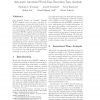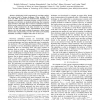402 search results - page 2 / 81 » Automatic Abstraction for Worst-Case Analysis of Discrete Sy... |
ECRTS
2002
IEEE
13 years 10 months ago
2002
IEEE
In today’s technical world (e.g., in the automotive industry), more and more purely mechanical components get replaced by electro-mechanical ones. Thus the size and complexity o...
WCET
2007
13 years 6 months ago
2007
Our research focuses on formally bounded WCET analysis, where we aim to provide absolute guarantees on execution time bounds. In this paper, we describe how amortisation can be us...
DATE
2010
IEEE
13 years 10 months ago
2010
IEEE
Abstract—Employing COTS components in real-time embedded systems leads to timing challenges. When multiple CPU cores and DMA peripherals run simultaneously, contention for access...
WCET
2008
13 years 6 months ago
2008
TUBOUND is a conceptually new tool for the worst-case execution time (WCET) analysis of programs. A distinctive feature of TUBOUND is the seamless integration of a WCET analysis c...
CASES
2005
ACM
13 years 7 months ago
2005
ACM
The concurrent synchronous language Esterel allows proto treat reactive systems in an abstract, concise manner. An Esterel program is typically first translated into other, non-s...


